|
|
|
Sort Order |
|
|
|
Items / Page
|
|
|
|
|
|
|
| Srl | Item |
| 1 |
ID:
083489
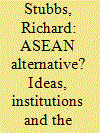

|
|
|
|
|
| Publication |
2008.
|
| Summary/Abstract |
Over the last 40 years ASEAN has developed a set of goals and norms with regard to the conduct of regional and international relations that provide an alternative paradigm to the dominant contemporary Western liberal approach to 'global' governance. ASEAN's alternative paradigm is rooted in Asia's cultures and the region's colonial and Cold War experiences. Using an historical institutionalist approach, the analysis details the paradigm's central features - the importance of neutrality; sovereignty and territorial integrity; the peaceful settlement of disputes; informal, non-confrontational negotiations; and the promotion of domestic stability and social harmony - which together underscore the importance of state autonomy and non-interference in the affairs of other states. The paradigm's influence in global affairs has increased markedly in recent years, most notably as the ASEAN-China linkage has matured and China has given its strong support to ASEAN's approach to the conduct of international relations. This turn of events suggests that the ASEAN paradigm presents a significant challenge to Western hopes for a common approach to 'global' governance.
|
|
|
|
|
|
|
|
|
|
|
|
|
|
|
|
| 2 |
ID:
080573
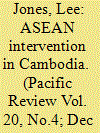

|
|
|
|
|
| Publication |
2007.
|
| Summary/Abstract |
Despite their other theoretical differences, virtually all scholars of the Association of Southeast Asian Nations (ASEAN) agree that the organization's members share an almost religious commitment to the norm of non-intervention. This article disrupts this consensus, arguing that ASEAN repeatedly intervened in Cambodia's internal political conflicts from 1979 to 1999, often with powerful and destructive effects. ASEAN's role in maintaining Khmer Rouge occupancy of Cambodia's UN seat, constructing a new coalition government in exile, manipulating Khmer refugee camps and informing the content of the Cambodian peace process will be explored, before turning to the 'creeping conditionality' for ASEAN membership imposed after the 1997 'coup' in Phnom Penh. The article argues for an analysis recognizing the political nature of intervention, and seeks to explain both the creation of non-intervention norms and specific violations of them as attempts by ASEAN elites to maintain their own illiberal, capitalist regimes against domestic and international political threats.
|
|
|
|
|
|
|
|
|
|
|
|
|
|
|
|
| 3 |
ID:
158635
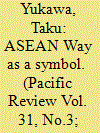

|
|
|
|
|
| Summary/Abstract |
Has the ‘ASEAN Way’ – a set of rules of the Association of Southeast Asian Nations (ASEAN) centered on the principle of non-interference and consensus decision-making – really established its position as an ASEAN norm? This paper aims to analyze the discourses of each ASEAN country and empirically explain their attitudes toward the norm. Specifically, I review various documentations to examine how various ASEAN diplomats have used the term ‘ASEAN Way.’ How did they come to call the principle of non-interference and consensus decision-making ‘ASEAN Way’ in the early 1990s? Why have they begun using the term negatively, as something to be reformed, in recent years? By describing the discourses on the ‘ASEAN Way’ and their changes over the years, I show that the rationality of non-interference and consensus decision-making has changed over time and shifted the positioning of the ‘ASEAN way’ as a symbol. This presents a new and empirical interpretation of the changes in ASEAN Norms.
|
|
|
|
|
|
|
|
|
|
|
|
|
|
|
|
| 4 |
ID:
168171
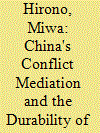

|
|
|
|
|
| Summary/Abstract |
China's efforts in conflict mediation are an important test of the durability of the principle of non-interference. By analysing the approaches and means of China's post-2014 mediation efforts in Afghanistan, this article finds that China's behaviour shows it engages in medium-level interference in domestic affairs, but mostly with the host government's concurrence. This is because of the two forms China's mediation takes. In a bilateral context, China's mediation takes the form of “incentivizing mediation,” in which its economic power, and its omnidirectional foreign policy, provide incentives or leverage for warring factions to come to the negotiation table, but which also lets the warring factions formulate their own roadmap to peace talks. In a multilateral context, China sometimes engages in “formulative mediation,” in which the mediators, not the disputing parties, formulate a roadmap to peace talks.
|
|
|
|
|
|
|
|
|
|
|
|
|
|
|
|
| 5 |
ID:
168169
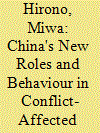

|
|
|
|
|
| Summary/Abstract |
China's view on the sanctity of state sovereignty has slowly but inexorably been transformed, and the country has found it difficult to continue to adhere to the principles of non-interference and non-intervention with the same degree of rigour as during the Cold War era. This special section will explore what the principles mean to China today; why and how Beijing has become active in peacebuilding and conflict mediation; and what implication China's approach to the principles has for its position in the global liberal order. This article sets the scene by firstly demonstrating that defining the principles has always been a political act, and secondly offering new discussions about how China's expanding economic power forced the country to more actively engage in politics of conflict-affected regions. Finally, it offers a conceptual framework to explain why and how China has become increasingly active in peacebuilding and conflict mediation.
|
|
|
|
|
|
|
|
|
|
|
|
|
|
|
|
| 6 |
ID:
161560
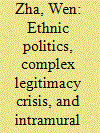

|
|
|
|
|
| Summary/Abstract |
This article examines ethnic conflict and its impacts on intramural relations within the Association of Southeast Asian Nations (ASEAN). It suggests that ethnic politics at home often propels leaders to get involved in ethnic conflict elsewhere. In the ASEAN context, regional institutions, especially the principle of non-interference, mitigate the effects of ethnic politics and preclude the possibility of coercive intervention. The third state is more likely to appeal to facilitation or mediation. On the side of the host state, when the regime faces complex legitimacy crisis, it is more likely to reject the third state's involvement. Ethnic conflict is likely to cause diplomatic tussles between the two states. In contrast, when the regime of the host state enjoys a higher level of legitimacy, it is more amenable to the third party's mediation. Cooperation on conflict management will foster inter-state trust. This article illustrates the above mechanism by examining Malaysia's role in Thailand and the Philippines’ ethnic insurgencies.
|
|
|
|
|
|
|
|
|
|
|
|
|
|
|
|
| 7 |
ID:
153641
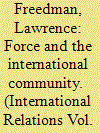

|
|
|
|
|
| Summary/Abstract |
Tony Blair’s April 1999 Chicago speech is widely seen as foreshadowing his later decision to support the invasion of Iraq. Two sets of context for the speech are described: other criteria for the use of force, going back to the Just War tradition and more recent contributions from Caspar Weinberger and Colin Powell, and the December 1998 strikes against Iraq and the Kosovo War, which began in March 1999. The origins of the five factors mentioned when considering force are explored and their implications assessed.
|
|
|
|
|
|
|
|
|
|
|
|
|
|
|
|
| 8 |
ID:
143696


|
|
|
|
|
| Summary/Abstract |
This article explicates the East Asian concept of non-interference, looks at the merits and problems in interference in the region, and concludes by referring to statistical evidence that the practice of non-interference in East Asia has been crucial for the near-disappearance of battle deaths regionally since 1979.
|
|
|
|
|
|
|
|
|
|
|
|
|
|
|
|
| 9 |
ID:
161619


|
|
|
|
|
| Summary/Abstract |
In light of seemingly growing divergence between the so-called ‘West’ and the Rest regarding the maintenance of international order, this paper seeks to sort through the conceptual muddle of ‘internationalism’ that still characterises much discussion of foreign policy today, especially with reference to emerging states. The leading states of the Global South have sought to respond to the crisis of conceptualisation and implementation that has attended Western practice of internationalism since the end of the Cold War. This paper seeks to analyse the alternative they claim to propose.
|
|
|
|
|
|
|
|
|
|
|
|
|
|
|
|
| 10 |
ID:
141731
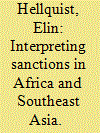

|
|
|
|
|
| Summary/Abstract |
The Organization of African Unity (OAU) and the Association of Southeast Asian Nations (ASEAN) were both born to stabilise vulnerable state borders by practising non-interference in domestic affairs. Today, the OAU’s successor, the African Union (AU), uses sanctions against unconstitutional changes of government, while ASEAN continues to rule out any collective punitive action against members. To explain these divergent trajectories, this article first shows how different traditions produced different ways of engaging with sanctions in the early formative cases of South Africa and Vietnam. Thereafter, it examines how these traditions were selectively re-thought when confronted with the dilemmas of international sanctions against Libya and Myanmar. The interpretive approach enables a nuanced account of continuity and change in beliefs about sanctions. The AU’s sanctions doctrine has updated rather than broken with a traditional interpretation of non-interference. For ASEAN, the longstanding tradition of informality – and not strict adherence to non-interference – has continued to rule out regional sanctions.
|
|
|
|
|
|
|
|
|
|
|
|
|
|
|
|
| 11 |
ID:
137198
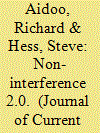

|
|
|
|
|
| Summary/Abstract |
China’s non-interference policy has come under scrutiny in regards to its growing and deepening relations in Africa. The policy has come to represent an about-face from conditional assistance and investment associated with the Washington Consensus. Although often well received in much of the global South, this policy has drawn a lot of criticism from the West and others. These commentators have perceived non-interference as an opportunistic and often inconsistent instrument for enabling China’s increasing access to African resources and markets. This article suggests that despite some consistent support for the rhetoric of non-interference, China’s implementation of the policy has become increasingly varied and context-ualized in reaction to Africa’s ever-more diversified political and economic landscape since the early 2000s.
|
|
|
|
|
|
|
|
|
|
|
|
|
|
|
|
| 12 |
ID:
106017


|
|
|
|
|
| Publication |
2011.
|
| Summary/Abstract |
The responsibility to protect (R2P) comprises each state's responsibility to protect its own populations from genocide, war crimes, ethnic cleansing and crimes against humanity, the international community's duty to assist states in this endeavour, and a responsibility for the international community to take timely and decisive action in situations where the host state has manifestly failed. At first glance, the latter two elements of this principle seem to require behaviour that contradicts the principle of non-interference. This raises questions as to why R2P was endorsed by Southeast Asian governments and whether it can be localised in a region whose politics are underpinned by non-interference. This article argues that processes of norm localisation are producing an accommodation between the two principles. This accommodation involves the formal retention of both principles but the subtle realignment of each in order to make them compatible and make support for both coherent. It is this third explanation, we argue, that best explains the relationship between R2P and non-interference in Southeast Asia: R2P has been revised to limit its capacity to legitimise coercive interference, whilst non-interference is in the process of being recalibrated to permit expressions of concern, offers of assistance and even the application of limited diplomatic pressure in response to major humanitarian crises. Thus, whilst the region remains largely hostile to doctrinal revisions to non-interference, subtle changes are evident in practice. This article outlines the evolution of R2P as a challenge to traditional notions of state sovereignty, provides an overview of non-interference and past efforts to revise the principle, and examines two case studies to understand how the two principles are being accommodated in practice.
|
|
|
|
|
|
|
|
|
|
|
|
|
|
|
|
|
|
|
|
|